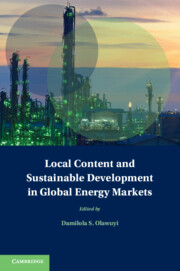Book contents
- Local Content and Sustainable Development in Global Energy Markets
- Reviews
- Treaty Implementation for Sustainable Development
- Local Content and Sustainable Development in Global Energy Markets
- Copyright page
- Contents
- Preface and Acknowledgements
- Abbreviations
- Editor
- Contributors
- Part I Introductory Context and Principles
- 1 Local Content and the Sustainable Development Nexus
- 2 Defining the ‘Local’ in Local Content Requirements in the Oil and Gas Sector
- 3 Local Content Measures and the WTO Regime: Addressing Contentions and Trade-offs
- 4 Local Content Requirements in Extractive Industries: A Human Rights Analysis
- 5 Upgrade of Local Suppliers in the Global Production Network: The Success or Otherwise of Local Content Regimes
- Part II Case Studies
- Part III Lessons Learned and Future Directions
- Index
5 - Upgrade of Local Suppliers in the Global Production Network: The Success or Otherwise of Local Content Regimes
from Part I - Introductory Context and Principles
Published online by Cambridge University Press: 05 March 2021
- Local Content and Sustainable Development in Global Energy Markets
- Reviews
- Treaty Implementation for Sustainable Development
- Local Content and Sustainable Development in Global Energy Markets
- Copyright page
- Contents
- Preface and Acknowledgements
- Abbreviations
- Editor
- Contributors
- Part I Introductory Context and Principles
- 1 Local Content and the Sustainable Development Nexus
- 2 Defining the ‘Local’ in Local Content Requirements in the Oil and Gas Sector
- 3 Local Content Measures and the WTO Regime: Addressing Contentions and Trade-offs
- 4 Local Content Requirements in Extractive Industries: A Human Rights Analysis
- 5 Upgrade of Local Suppliers in the Global Production Network: The Success or Otherwise of Local Content Regimes
- Part II Case Studies
- Part III Lessons Learned and Future Directions
- Index
Summary
Local content requirements (LCRs) seek to increase the quantum of composite value added to, or created in, the local economy through the utilization of local resources and services in the exploration, development, exploitation, transportation, and sale of local resources. These result in the development of local capabilities, without compromising quality, health, safety, or environmental standards. However, regarded as protectionist regimes, they may contravene international trade agreements and conventions, except where exemptions apply. Furthermore, opponents of protectionism, in defending free trade argue that government measures constitute major impediments to economic growth. They blame inequitable tax regimes, restrictions on international trade, misuse of resources, lack of savings, amongst others, as responsible for the decline in economic growth.
On the other hand, lessons from East Asia and other developed countries teach us that to strengthen the market, government guidance is important. Developed countries, at one point or another, have used protectionist regimes to achieve industrialization and to upgrade products and services. There is a stronger case for African countries, who battle with the demands of development in a globalized world, that is ever more competitive and volatile for weaker countries.
If developing countries must develop, upgrade their products, and compete favourably in today’s globalized economy, protectionist policies, in the form of LCRs, are inevitable. Increased state capacity becomes a prerequisite for upgrading local products and services and achieving competitiveness in the global market. Analysing the Nigerian Oil and Gas Industry Content Development Act (NOGICD Act) enacted in 2010 and its effects since enactment, we illustrate how protectionist policies may lead to the upgrade of local products and services, competitiveness, and stronger relevance of local suppliers in the global production network.
- Type
- Chapter
- Information
- Publisher: Cambridge University PressPrint publication year: 2021

